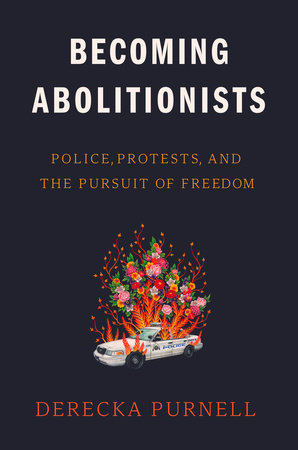
Becoming Abolitionists: Police, Protests, and the Pursuit of Freedom by Derecka Purnell
Becoming Abolitionists is human rights lawyer, Atlantic staff writer, and community organizer Derecka Purnell’s debut book. An exploration of her journey toward accepting police abolition as an inevitable answer for safe communities, it is part memoir, part history lesson, and part invitation to join a movement. Incredibly convincing in its arguments, there’s an earnest warmth running through it that welcomes questions and celebrates the grassroots efforts of the people working toward change. Becoming Abolitionists is a personal window into the injustice of the police state on the world’s poor and oppressed, and a guide for those who want to understand its history, and work to abolish it.
Purnell grew up in St. Louis; after her father was killed in a work accident, her mom, siblings, and occasionally grandma shuffled between apartments in the same complex. Aspects of her life, from her father’s death and industrial toxins hanging over her childhood, to post-9/11 security checks and student resource officers in high school, and the murder of young men she knew and loved reflected something that she felt was off. Purnell’s proximity to this world jump started her awareness of state-sanctioned violence on the country’s poorest. When people hear about police abolition and dismiss it as abandoning neighborhoods and people to violence, she says, “…they tend to forget that often we are those victims, those survivors of violence.”
Purnell does a brilliant job of bringing to light what exactly felt off, and of highlighting the absurdity in the systems that our law is designed and instructed to uphold. From taking children away from parents for poverty-related offenses and then responding by increasing funding for foster parents, to George Zimmerman’s acquittal under a law that makes shooting an unarmed teenager permissible, the book is filled with examples of these inconsistencies. Much of the book is spent in clear, thorough examinations of these anecdotes, which are fleshed out at times to humanize the oppressor as well the oppressed.
Purnell expounds on policing as a system rooted in oppression all over the world; from Ferguson, to South Africa and the Caribbean. The book is packed with history that traces our young country’s dependence on genocide and slavery to one that’s evolved to be characterized by “militarism, policing and a concentration of wealth for a few.” She builds the reader’s understanding of the many intersections of racial violence through chapters on sexual violence, ableism, and environmental justice. The realization that police reform has only failed, that ending policing outright is the only option feels like a big moment; we’ve tried the body cameras, the decreased funding, the accountability laws. But a system rooted in upholding wealth and power for a few is a system that won’t ever allow itself to make any lasting or real change.
Within Becoming Abolitionists is an invitation to take a deep breath and meet questions and uncertainty with honesty. What about murderers and rapists? Purnell is comfortable with there being no simple, or single answer. With an astronomical budget to supposedly keep us safe from these things, why isn’t our expectation that societal violences be eradicated? When broken down through a human lens into what she calls “digestible social problems,” what’s stopping us from working together to address these things? Grassroots efforts that respond to specific issues like mental health, lack of access to childcare, etc. are cheaper, build communities, welcome creativity, and are successful at preventing harm. Purnell imagines a holistic future for a society of people that supports one another and their diverse needs.
Becoming Abolitionists is somehow both a fiery and a welcoming invitation to join a community focused on taking care of one another. It’s a reckoning with the failures of all of the police reforms that have seemed like wins and good ideas. It’s a celebration of the giant web of grassroots efforts that are already ushering in change. Derecka Purnell is convinced that our focus need not be on the utopian ending, but on the process that’s rooted in loving, learning, and leaning on one another. When that happens, we’ll forget there was ever a time that calling the police for help was a thought.
Caitlin Spanjer works learning about history with middle school students in Oregon, and in her spare time turns to fiction and non-fiction to dream up a world of restored relationships and perfect beauty.